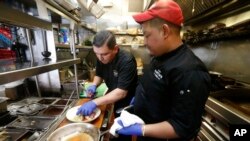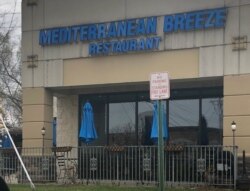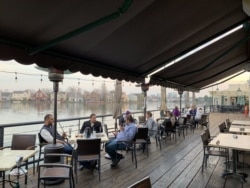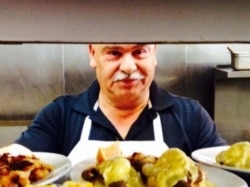Months before coronavirus fears swept the United States, business was already slow at Mediterranean Breeze, a family-owned Greek restaurant in suburban Washington, D.C.
Owner and primary chef Terry Kasotakis, along with general manager Paul Johnson, were optimistic the bottom line would improve once the weather got warmer.
“We all were weathering the storm through January and February,” Johnson says. “We were just kind of holding our breath for April because we have a big outdoor section and it's very popular, and it holds a lot of people.”
Last week, business at the Virginia eatery was down 90%.
“It was horrid, horrid,” Johnson says. “We’re concerned…Most of us don't really know where this is all headed.”
Virginia allows law enforcement to enforce a 10-person limit in restaurants. Several U.S. states have gone further in an effort to stem the spread of coronavirus.
The governors of California, Connecticut, Ohio, Illinois, New York, New Jersey, Massachusetts and Washington state are among those who have ordered restaurants and bars to close their dining rooms, limiting the establishments to carry-out or delivery service.
“We ought to be worried about the mom-and-pop type bar [or] restaurant less than we do Disney, which has the resources to muscle through this,” says Ball State University economist Michael Hicks.
The U.S. Congress is considering measures that would expand lending to small businesses impacted by coronavirus. Those loans would not make up for financial losses, but they could make it possible for an establishment to stay afloat.
“The problem with a small restaurant, if you close, you still have to pay your insurance, you still have to pay an electric bill, you still have to pay rent,” Hicks says. “And so, if you could borrow enough money to make those payments for six weeks, you're still going to have lost money, right? But you'll still be able to open, perhaps.”
Anwar Halteh owns Waterfront Pizza in Foster City, California, outside of San Francisco. Although he expects to lose 70% of his business, Halteh is optimistic his business can survive, despite being forced to close down his dining areas, which include a scenic outdoor section by the water.
“I expect (carry-out) to give us maybe 30% of business, but we cut down our overhead by 80% so we should be able to be okay,” he says. “I let everybody stay home because I don't need servers to take food to the tables. So, I only keep three people in the whole restaurant cleaning and cooking.”
As a small-business owner, Halteh says he cannot afford to keep paying the employees he doesn’t have any work for. But he is hopeful that things will eventually be back to normal.
“I think, after it’s over, everything's going to be a booming economy,” Halteh says. “I feel optimistic.”
Back in Virginia, the folks who run the Mediterranean Breeze can only hope business will soon be back to where it was.
"I'm optimistic and hopeful that the virus situation will start to subside in the next five to 10 days, although I know a lot of the professionals are saying that's not going to be the case,” Johnson says.
He does not expect the restaurant, which has been in operation for 15 years, to survive more than a month if business does not improve.
“The local businesses that aren’t supported by major corporations, the national chains, those are the ones that are really hurt here,” says Johnson, who hopes more people will consider giving their carry-out business to independently owned restaurants like Mediterranean Breeze.
“You know, an extra 30 of them (pickup orders) a week might be the difference between that place still being here in six months.”







